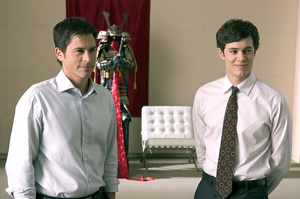 KRT DIRECT
KRT DIRECTThe newly released film, “Thank You for Smoking,” adapted from Christopher Buckley’s 1994 novel of the same title, has a connection to Washington University. That connection is Professor Richard Chapman, Wash. U.’s senior lecturer in screenwriting in the Film and Media Studies department. Chapman, along with writing partner E. Jack Kaplan, adapted the first draft of the screenplay back in 1994 when Buckley’s novel was released.
“Thank You for Smoking” is not the first of Professor Chapman’s screenplay endeavors. Chapman is a veteran screenwriter who has been in the business for years. He co-wrote the screenplay for the film “My Fellow Americans” (again with writing partner Kaplan) and also more recently co-wrote the HBO original film “Live From Baghdad,” which garnered him an Emmy nomination for Outstanding Writing for a Miniseries, Movie or Dramatic Special.
Unfortunately, the script Professor Chapman penned for “Thank You for Smoking” did not get produced until ten years later, after a few revisions and production company changes. Hence, Chapman’s name does not appear in the credits as screenwriter. However, Chapman is still pleased with the results of the movie and feels that his work has contributed to its success. This is what Professor Chapman had to say about his work on the script.
Cadenza: So when exactly did you start writing the screenplay for “Thank You for Smoking”?
Chapman:My writing partner E. Jack Kaplan started working on the script in 1994, shortly after Christopher Buckley released the novel. The rights to the novel were purchased by Mel Gibson’s production company Icon Productions, and we were writing at Warner Brother’s at the time where Gibson had his contract for Icon. Mel was actually supposed to star in the film and possibly direct it. We were the first people to adapt the book and we met with Christopher Buckley and it was all one big happy family. We came up with a script that everybody liked, and we even had a staged reading for the film with stars like James Coburn, Sela Ward and Michael McKean.
Cadenza: So what happened with the production of your screenplay?
Chapman: Well, they [Icon] were considering it for production when Mel Gibson got an offer to do the movie “Ransom.” So that delayed the movie another year down the road. Then Icon was unable to produce the film for one more year so they brought in a writer to do a rewrite of the screenplay. That writer was Roger Avary, Tarantino’s writing partner. Several other drafts were written by other writers as well, and this is a well known process within the industry where tons of writers are brought in. I’ve done my share of rewriting myself. In this particular case, writing the first draft was really a delightful job because the book was so good. It was a matter of selecting different material that was suitable to make three acts of a movie, and we had to create cinematic structure from the novel. Unfortunately, what essentially happened was that Icon couldn’t launch the movie, as they kept picking other movies to produce. The timing was off, and the smoking issue was made less relevant as the political position on tobacco changed due to the tobacco companies’ admittance that nicotine was addictive.
Cadenza: How was your screenplay different from the one used in the newly released “Thank You for Smoking”?
Chapman: Overall, the production of our screenplay was going to have a significantly larger budget, as Mel Gibson and Warner Brothers were producing it. Hence, there were sequences that required larger-scale production. In the end sequence of the movie, during a funeral, we were going to have jets fly by streaming smoke for a death of the member of a tobacco company. Another large-scale scene took place involving a kidnapping with nicotine patches. A big difference in Reitman’s version of the screenplay is that he added the son of Nick Naylor as an extra character. The book actually only slightly mentions the son, so that part of Reitman’s screenplay is the biggest difference. However, because we were both adapting a book, there are obvious similarities between the two screenplays.
Cadenza: What is your opinion of Reitman’s version of “Thank You for Smoking”?
Chapman: What I think Reitman has been able to do is to use Buckley’s somewhat outdated book in a cleverly done contemporary context. The story appears authentic and still works in today’s world. This small independent company figured out a way to produce the film for about a quarter of the price, which is impressive. I liked the movie and congratulate them on doing a good job.
The present version of “Thank You for Smoking” is both written and directed by Jason Reitman. The film has opened to numerous positive reviews as a biting satire on the tobacco industry and the practice of lobbying in general. Aaron Eckhart stars in the movie as Nick Naylor, a lobbyist for the Academy of Tobacco whose ability to put a positive spin on the idea of selling cigarettes is often hilarious. Naylor’s main nemesis in the movie is Vermont Senator Ortolan Finistirre (William H. Macy), a Birkenstock-sporting environmentalist. Other characters in the movie include the additional two members (besides Naylor) of the cleverly named MOD (Merchants of Death) Squad-alcohol lobbyist Polly Bailey (Maria Bello) and firearms lobbyist Bobby Jay Bliss (David Koechner)-as well as journalist Heather Holloway (Katie Holmes), Hollywood agent Jeff Megall (Rob Lowe), former “Marlboro Man” Lorne Lutch (Sam Elliott) and Big Tobacco’s “captain” (Robert Duvall). With such a solid lineup of actors in addition to a thoughtful novel-to-big-screen adaptation, it is easy to see why this film has received such critical success.